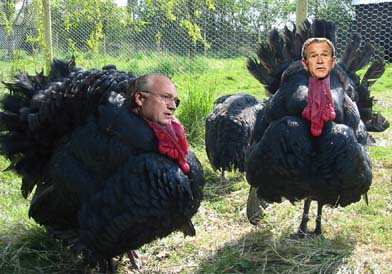
Couldn’t resist. Happy Thanksgiving!

Righties will believe absolutely anything, no matter how obviously fabricated or absurd, that affirms their hatreds and paranoia.
Gary Farber observes and wonders: “Maybe fluoride does do something to their brains.”
Un-bee-lee-vah-bull …..
Murray Waas writes in the National Journal about all the prewar Iraq intelligence that Congress never saw.
Ten days after the September 11, 2001, terrorist attacks on the World Trade Center and the Pentagon, President Bush was told in a highly classified briefing that the U.S. intelligence community had no evidence linking the Iraqi regime of Saddam Hussein to the attacks and that there was scant credible evidence that Iraq had any significant collaborative ties with Al Qaeda, according to government records and current and former officials with firsthand knowledge of the matter. …
…One of the more intriguing things that Bush was told during the briefing was that the few credible reports of contacts between Iraq and Al Qaeda involved attempts by Saddam Hussein to monitor the terrorist group. Saddam viewed Al Qaeda as well as other theocratic radical Islamist organizations as a potential threat to his secular regime.
This information was in the PDB, President’s Daily Brief, of September 21, 2001. The White House will not release the PDBs to the Senate Intelligence Committee, which has requested them repeatedly. Waas continues,
Much of the contents of the September 21 PDB were later incorporated, albeit in a slightly different form, into a lengthier CIA analysis examining not only Al Qaeda’s contacts with Iraq, but also Iraq’s support for international terrorism. …
… The conclusions drawn in the lengthier CIA assessment-which has also been denied to the committee-were strikingly similar to those provided to President Bush in the September 21 PDB, according to records and sources. In the four years since Bush received the briefing, according to highly placed government officials, little evidence has come to light to contradict the CIA’s original conclusion that no collaborative relationship existed between Iraq and Al Qaeda.
But, of course, that intelligence somehow got shoved under the rug.
But a comparison of public statements by the president, the vice president, and Secretary of Defense Donald Rumsfeld show that in the days just before a congressional vote authorizing war, they professed to have been given information from U.S. intelligence assessments showing evidence of an Iraq-Al Qaeda link.
The “intelligence” about an Iraq-al Qaeda link did not come from the CIA, but from “a covert intelligence unit set up shortly after the September 11 attacks by then-Undersecretary of Defense for Policy Douglas J. Feith.”
Feith was a protégé of, and intensely loyal to, Cheney, Rumsfeld, then-Deputy Defense Secretary Paul D. Wolfowitz, and Cheney’s then-chief of staff and national security adviser, I. Lewis (Scooter) Libby. The secretive unit was set up because Cheney, Rumsfeld, Wolfowitz, and Libby did not believe the CIA would be able to get to the bottom of the matter of Iraq-Al Qaeda ties. The four men shared a long-standing distrust of the CIA from their earlier positions in government, and felt that the agency had failed massively by not predicting the September 11 attacks.
Feith, also known as “the dumbest [expletive] guy on the face of the earth,” fed Rumsfeld and the White House tales that the CIA and other intel agencies had discarded, such as the “Atta in Prague” story. The Pentagon unit was considered a virtual alternative to the CIA in spite of the fact that most of Feith’s team had no formal training or experience in intelligence analyses.
Waas’s story shows Dick the Dick believing Feith’s version of reality over the CIA’s time and time again. It’s hard to tell if the alleged president, George W. Bush, was taking much interest in how intelligence was being analyzed.